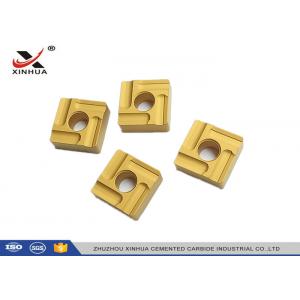Cemented Carbide Turning Inserts Machining Steel SNMG120408 High Presion
Add to Cart

Cnc Carbide Cutting Tools Cemented Carbide Inserts Machining Steel
Description:
Cemented carbide is a hard material used extensively as cutting tool material, as well as other industrial applications. It consists of fine particles of carbidecemented into a composite by a binder metal. Cemented carbides commonly use tungsten carbide (WC), titanium carbide (TiC), or tantalum carbide (TaC) as the aggregate. Mentions of "carbide" or "tungsten carbide" in industrial contexts usually refer to these cemented composites.
Cemented carbides are metal matrix composites where carbide particles act as the aggregate and a metallic binder serves as the matrix (like gravel aggregate in a matrix of cement makes concrete). Its structure is thus conceptually similar to that of a grinding wheel, except that the abrasive particles are much smaller; macroscopically, the material of a carbide cutter looks homogeneous.
The process of combining the carbide particles with the binder is referred to as sintering or hot isostatic pressing (HIP). During this process, the binder eventually will be entering the liquid stage and carbide grains (much higher melting point) remain in the solid stage. As a result of this process, the binder is embedding/cementing the carbide grains and thereby creates the metal matrix composite with its distinct material properties. The naturally ductile metal binder serves to offset the characteristic brittle behavior of the carbide ceramic, thus raising its toughness and durability. By controlling various parameters, including grain size, cobalt content, dotation (e.g., alloy carbides) and carbon content, a carbide manufacturer can tailor the carbide's performance to specific applications.
The first cemented carbide developed was tungsten carbide (introduced in 1927) which uses tungsten carbide particles held together by a cobalt metal binder. Since then other cemented carbides have been developed, such as titanium carbide, which is better suited for cutting steel, and tantalum carbide, which is tougher than tungsten carbide.
Product Group : | turning inserts |
| Classification : | INDEXABLE TURNING - INSERTS |
| Corner chamfer width | 0.4,0.8,1.2mm |
| Chip breaker face count | PM,DM,TC |
| Tolerance class insert | K - Cold formed |
| Clearance angle major | 80degree |
| Cutting edge length | 12.7mm |
| Inscribed circle diameter12.7 | 12.7mm |
| Insert thickness | 4.76mm |
| Material | Material Characteristics |
| Carbon Steel, Alloy Steel and Tool Steel 36-48 HRC: | • Higher carbon content • Higher chrome, nickel, and moly content • Tough material to machine • Abrasive • Difficult to break and control the chip flow • The material surface will harden when machined at high speed • Good surface finish |
| Ferritic, Martensitic, and PH Stainless Steel under 48 HRC | • Brittle • Stringy chips • High cutting force • The material will harden when machined at high speed. |
| Austenitic Stainless Steel: | • Becomes gummy under machining operations due to nickel content • Very difficult to machine in soft conditions • Very difficult to machine at a small depth of cut • Develops a tough string of chips that are difficult to control. Forms a build-up on the insert tip • Low thermal conductivity results in excess heat at the insert tip • Material surface will harden due to high chromium content |
| Ductile and Malleable Cast Iron | • Very difficult to machine • Small depth of cut • Spherical form graphite makes machining difficult • The carbide concentration creates hard spots • The material structure is not uniform • The crater wear and flank of the insert makes machining difficult • The insert tool life is less than gray cast iron |
| Gray Cast Iron | • Flake form of graphite makes machining easy • Contains scale, inclusions and sand in the surface • The material will break easily on the end of the cut • Tendency to chatter and vibrate on thin wall section • Chucking and rigidity of the workpiece is extremely important to minimize distortion, to achieve a good finish and close tolerance. |
Application:
Choose between the following options to find the best grade and
chipbreaker for your turning operations
Workpiece material:P steel;M stainless steel;K cast iron
Workpiece condition:Continuous Cutting;Light Interrupted Cutting;Heavy Interrupted Cutting
Roughing or Finishing:Finishing or Precision Cutting;Medium Cutting;Medium to Heavy Cutting.
| The Chipbreaker Instruction of Carbide Indexable CNC Turning Inserts | |
| DF | Chip-breaker with special angle design can make cut easy,control chip and get good surface quality. |
| DM | Widely used chip-breaker is used for semi-finishing and finishing machining steel and stainless steel. |
| DR | Special chip-breaker with high toughness cutting edge can reduce cutting force. |
| PM | With stronger cutting edge,it is better for intermittent cutting than -DM,with widely cutting zone of P type material. |
| HF | With sharp cutting edge,used for finishing machining inner hole,fine finishing surface can be got with small feed rate. |
| HM | With sharp wave cutting edge to reduce cutting force,it is the first choice for semi-finishing machining of inner holes and can make chip flow smoothly. |
| HR | With tough cutting edge,used for roughing/machining of inner hole and intermittent machining workpiece with irregular surface. |
| LH | Mainly recommended for finish turning,Typical parts: Ordinary aluminum parts. |


